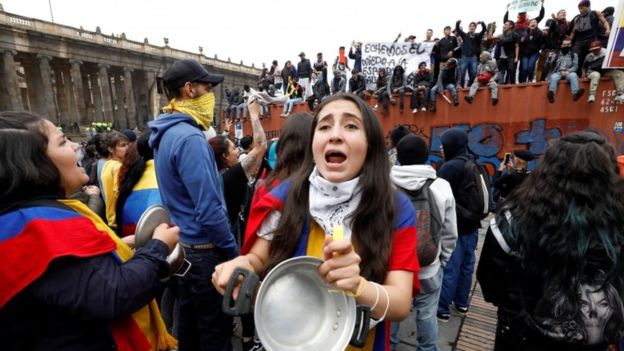On December 10, new protests erupted in Colombia against the regime of President Iván Duque and the cost-cutting measures it has employed at the behest of the International Monetary Fund. The cuts are in large part for the benefit of business interests that are closely aligned with Duque. Indigenous groups came from all over the country to converge in Bogotá.
To mark Human Rights Day, the streets once again filled with protesters. It has been 20 days since the general strike began on November 21. Hundreds of thousands of people took to the streets to protest upcoming austerity measures. The December 10 protests highlighted the abuses of the government institutions, particularly the Colombian riot control unit known as the Mobile Anti-Disturbance Squadron (ESMAD), which has committed a variety of criminal abuses, including the wounding and killing of demonstrators.
These protests occurred only a few days after thousands of participants and dozens of artists convened in Bogotá for “Un Canto por Colombia” (A Song for Colombia), an artistic activity that brought together thousands of people to the capital in a moving musical march and concert. Weeks into the protests, there seems to be no sign that the movement is tired or slowing. Rather, the movement is tired of the government’s policies and is taking the streets.
Polls show decreasing popularity for Duque, who despite only being in office for two years has an approval rating of less than 28%. Together, he and Chile’s President Sebastián Piñera are the two most repudiated leaders in Latin America.
And rightly so. Colombia and Chile are among the countries where the neoliberal project has been most firmly established, with precarious living conditions for broad sections of the population. In the case of Colombia, hundreds of killings have been committed against the indigenous and peasant populations across the country. Most recently, in August, eight children were killed when the army dropped bombs in a raid in the Colombian countryside, sparking local and international backlash. The National Organization of Indigenous Colombians has said that 117 targeted killings happened in the last year, with virtually no one held responsible. But the problem isn’t just the assassinations—these assassinations support the infringement on indigenous people’s lands for capitalist profits. And this is what is at stake in these mobilizations and strikes, which threaten to shut down key industries.
Forbes says, “The persistence of the protests, plus with the participation of people from deep in the jungles where oil drilling and mining takes place, could present challenges to a national petroleum industry counting on new reserves to meet mid-term needs.” In other words, the capitalists are worried.
Various trade union organizations, personalities, and representatives of political forces of the bourgeois opposition have taken the opportunity to call for “peaceful” demonstrations. There is hope that these calls will strengthen the negotiations, which the government seeks to use to deflect and decompress the general discontent.
Unfortunately, the leadership of the movement united in the Comité Nacional del Paro (National Strike Committee) continues to lend itself to Duque’s delays with their “dialogue tables.” If the mass demonstrations do not continue to progress, it will in large part be because of the pacifying role played by this leadership.
As we have been writing from Left Voice—“although the union leadership publicly criticizes Duque for his social and economic policies, their primary position is to contain the situation and try to prevent Colombia from moving towards a scenario similar to that of Chile.”
This article first appeared in Spanish at La Izqierda Diario (LID) on December 11, 2019.










